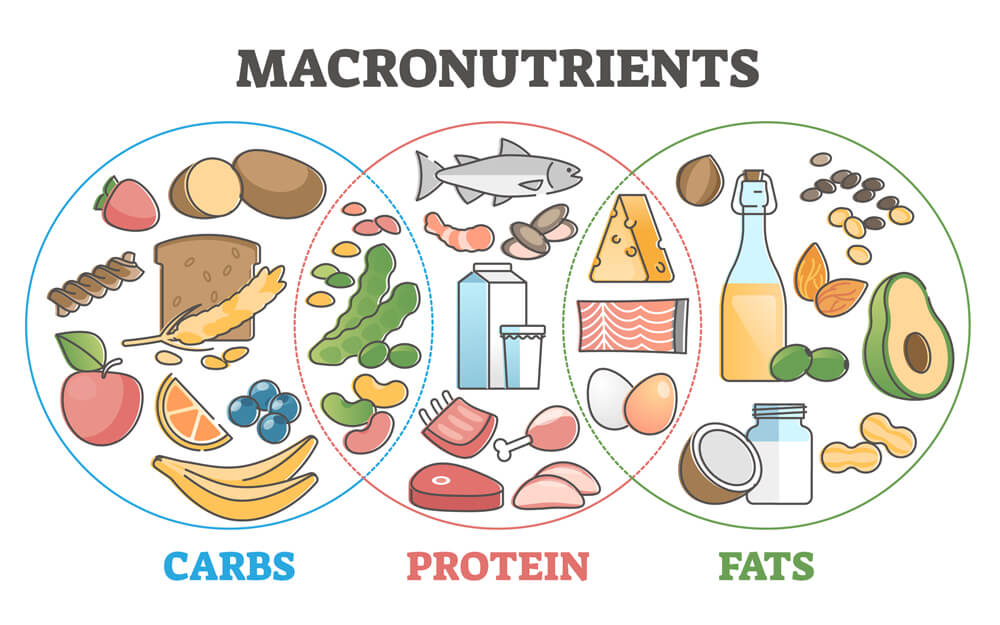Are you curious about how macronutrients impact weight loss? Understanding the role of carbohydrates, proteins and fats in our bodies is crucial for achieving weight loss. This article explores the concept of macronutrients. Discusses the perspective of the eHealth Hub on weight loss. Lets dive in!
1. Getting Started
Many people strive to lose weight. Its important to approach it in a healthy and sustainable manner. To do so we need to have an understanding of how macronutrients affect our bodies.
2. What are macronutrients?
Macronutrients are the components of our diet that provide energy and essential nutrients for our body to function properly. They consist of carbohydrates, proteins and fats.
2.1 Carbohydrates
Carbohydrates serve as our bodys source of energy and come in different forms like sugar, starch and fiber. Simple carbohydrates found in drinks and sweets are easily digested but can cause spikes in blood sugar levels. On the hand complex carbohydrates found in whole grains and vegetables release energy steadily while being rich, in essential nutrients.
2.2 Proteins
Proteins are components that form the foundation of our bodies and have a vital function in repairing and constructing tissues. They consist of acids and are necessary for numerous bodily functions. Excellent sources of protein include meats, poultry, fish, legumes and dairy products.
2.3 Fats
to popular belief fats are not entirely harmful to our well being. In fact they play a role in aiding the absorption of fat soluble vitamins and hormone production. Healthy sources of fat encompass avocados, nuts, seeds and olive oil. However it’s important to consume fats in moderation due to their calorie content.
3. Importance of macronutrients for weight loss
Understanding the significance of macronutrients in achieving weight loss goals is crucial when developing a strategy. Lets delve into some aspects regarding macronutrients and how they contribute to attaining our desired weight loss outcomes.
3.1 Balancing Macronutrients
Attaining a balance of macronutrients is essential for overall health and effective weight management. Each macronutrient serves a purpose within our bodies and an imbalance can lead to various health issues. By comprehending the equilibrium between carbohydrates, proteins and fats in our diets we can optimize our journey, towards successful weight loss.
3.2 Achieving Energy Balance
When it comes to losing weight the key is to create an energy deficit by consuming calories than we burn. Different macronutrients provide varying amounts of calories per gram; carbohydrates and proteins provide 4 calories per gram while fats provide 9 calories per gram. By understanding the energy content of macronutrients we can make choices and create a calorie deficit that is suitable for weight loss.
3.3 Feeling Satisfied with Macronutrients
The macronutrients we consume can also impact how satisfied and full we feel after a meal. Proteins and fats tend to be more satiating than carbohydrates. Including protein and healthy fats in our diets can help us stay fuller for longer reduce the chances of overeating and support weight loss efforts.
4. The Perspective of the eHealth Hub
The eHealth Hub (EHH) provides insights into macronutrients and their role in weight loss. Lets delve into their perspective and recommendations.
4.1 Recommended Macronutrient Intake
According to the EHH it’s important to maintain a distribution of macronutrients in our diet. They recommend consuming 45 65% of total daily calories, from carbohydrates 10 35% from proteins and 20 35% from fats. These recommendations ensure that we receive essential nutrients while working towards our weight loss goals.
4.2 Strategies for Losing Weight
The importance of taking an approach to weight loss is emphasized by the AHA. They suggest combining a balanced intake of macronutrients with regular physical activity, portion control and mindful eating habits. By incorporating these methods individuals can achieve weight loss while also improving their overall health.
5. Tips for Incorporating Macronutrients into Your Diet
Incorporating macronutrients into your diet doesn’t have to be complicated. Here are some practical suggestions to help you make choices;
5.1 Choosing Carbohydrates
Opt for complex carbohydrates like whole grains, fruits and vegetables. These options provide a release of energy and are packed with essential nutrients and fiber.. Limit refined sugars and processed foods as they can lead to energy crashes and hinder your weight loss efforts.
5.2 Sources of Protein
Include protein sources in your meals such as skinless poultry, fish, legumes and low fat dairy products. These choices offer amino acids while being lower in saturated fat compared to fatty meats. Adding protein to each meal can aid in promoting satiety well as supporting muscle repair and growth.
5.3 Incorporating Healthy Fats
Make sure to include fats in your diet like avocados, nuts, seeds and olive oil. These fats are abundant, in omega 3 fatty acids which contribute to health benefits.
Just remember to eat them in moderation since they have a calorie content.
6. misconceptions regarding macronutrients and losing weight
There are a few misconceptions surrounding macronutrients and weight loss that we should address. Lets tackle two ones:
6.1 “Low Carb” Diets
In recent years low carbohydrate diets have become popular for weight loss purposes. While reducing intake can initially lead to shedding water weight, the long term effectiveness and sustainability of such diets remain controversial. It’s crucial to focus on the quality of carbs consumed than eliminating them entirely.
6.2 The role of fats
Many still hold the belief that all fatsre unhealthy and should be avoided altogether. However not all fats are created equal. Healthy fats like those found in avocados, nuts and olive oil are a component of a well balanced diet. Choosing the types of fats and consuming them in moderation is key.
7. Conclusion
Understanding macronutrients and their impact on weight loss is vital for achieving results. By maintaining an intake of carbohydrates, proteins and fats as recommended by the eHealth Hub we can optimize our journey, towards losing weight.
Make sure to prioritize rich whole foods and adopt a holistic approach that incorporates regular exercise and mindful eating habits.
8. FAQs
1. How fast can I expect to lose weight on a macronutrient balanced diet?
The rate at which you lose weight depends on several factors, including your total caloric intake, activity level, and individual metabolism. Consistency and patience are key to sustained weight loss.
2. Can I eat any type of fat while maintaining a macronutrient balanced diet?
It’s important to focus on healthy fats, such as those found in avocados, nuts, and olive oil. Limit saturated and trans fats, which are found in processed and fried foods.
3. Can I still enjoy my favorite foods while following a macronutrient balanced diet?
Of course you can! The key is moderation and careful portion control. You can still enjoy your favorite foods while maintaining a balance of macronutrients and total calories.
4. Is it necessary to track macronutrients for weight loss?
While tracking macronutrients may be beneficial for some people, it’s not a requirement. Focus on incorporating a variety of nutrient-dense foods and adopting healthy eating habits.
5. Where can I learn more about macronutrients and weight loss?
For more detailed information and personalized guidance, consult with a registered dietitian or healthcare professional who can provide tailored recommendations based on your specific needs and goals.

